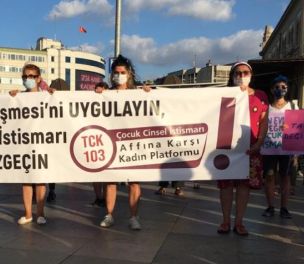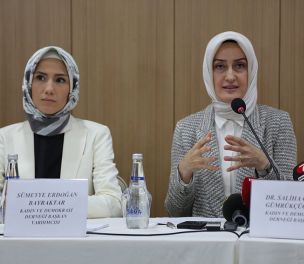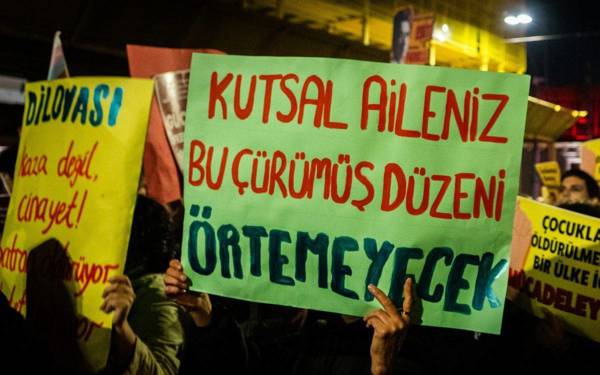Click to read the article in Turkish
"Technically, it is not possible for Turkey to 'abolish' or 'revise' the İstanbul Convention. Turkey cannot say, 'OK, I am revising it.' Because it is an international convention and it is within the discretion of all parties to amend it. If it wants, Turkey can - of course - say, 'I am withdrawing.'
"It will have grave consequences. Several steps taken in the face of violence against women will be lost. The gains and works in this field will go to waste. In fact, Turkey took quite serious steps in that regard..."
It is how Prof. Feride Acar raises concerns over the recent debates on Turkey's possible withdrawal from İstanbul Convention or, to put it in its full name, the Convention on Preventing and Combating Violence Against Women and Domestic Violence.
Prof. Feride Acar is the former President of the Group of Experts on Action against Violence against Women and Domestic Violence (GREVIO). GREVIO is the independent expert body which is responsible for monitoring the implementation of the İstanbul Convention.
That is why, she is one of the people knowledgeble of both the connection between Turkey and the convention and the responsibilities to be fulfilled by the states and authorities in protecting women from male violence.
'CoE perspective on Turkey to be adversely affected'
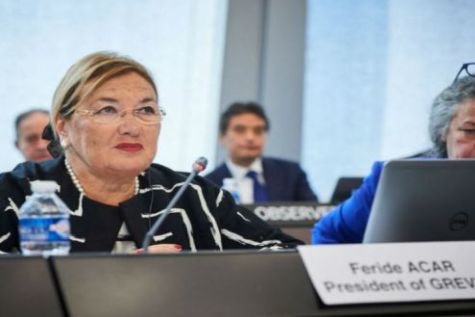
Acar speaks to bianet about the recent statements hinting that İstanbul Convention might be "revised" or "abolished." She is of the opinion that if Turkey withdraws from the convention, it will affect the Council of Europe's (CoE) perspective on Turkey quite negatively:
"I think that it will have some negative consequences in terms of the CoE's perspective on Turkey. I cannot name these consequences one by one, but - to me - it will be perceived as if Turkey withdrew from universal democracy, human rights, gender equality and prevention of violence.
"The recent debates on 'multiple bar associations', for instance, have affected the CoE circles quite negatively.
"The CoE Commissioner for Human Rights has quite clearly expressed her opinion and stated that the attitude taken towards the bars is not democratic in any way at all. We can guess that - just after this - a step like Turkey's withdrawal from İstanbul Convention will seriously affect our country's image and relations on the international platform."
As rightly put by Prof. Feride Acar, İstanbul Convention stipulates that the states shall assume responsibility in protecting individuals from violence. So, Acar comments: "If Turkey withdraws from the convention, it will be as if it said 'I will not protect them any more'."
Referring to the standards specified in the convention with regards to violence, Acar continues as follows:
"The convention says that violence against women is a violation of human rights. If Turkey withdraws from the convention, it will show that it will no longer abide by these values, which - in my view - will be very wrong for all people subjected to violence, especially women, and for our country..."
'Convention is not about family, but violence'
Acar reminds us that what the convention refers to as "domestic violence" in its English version has been translated into Turkish as "aile içi şiddet," which can also roughly translate as "intrafamilial violence."
Acar notes that the convention does not have a single article that targets the family, underlining that it is solely about violence inside the home.
"Turkey took important steps in the face of violence against women thanks to the convention," Acar says and warns, "Turkey set an important course of action about this issue. However, if it withdraws from the convention, it will waste all gains in that regard."
'There is nothing acceptable about this'
Concluding her remarks, Feride Acar briefly says the following:
"GREVIO monitored the implementation of İstanbul Convention by Turkey in 2018 and released its report. What Turkey did and what it failed to do is very clearly put forward in that report.
"This evaluation says that some positive steps taken about violence against women are important and refers to shortcomimgs and several institutional arrangements and practices that still need to be done.
"If Turkey withdraws from the convention now, it will lead the state to suffer a serious loss of trust on the international arena in terms of democracy and human rights. In Turkey, it will cause the struggle against male violence to lose pace. In some cases, it will even lead to deterioration in some gains.
"In order for us to be a country which 'has prevented violence against women,' as targeted by İstanbul Convention, there is a need for a serious mental transformation in terms of gender equality. It is actually where Turkey has the greatest difficulty. I think that this intention to give up on the convention is related with the inability to accept gender equality. In the third decade of 21st century, there is nothing acceptable about this."
About Prof. Dr. Feride AcarShe is a faculty member in the Department of Political Science and Public Administration of Middle East Technical University (METU) in Ankara, Turkey for almost forty years. She has also taught in METU's Gender and Women's Studies Graduate Program, of which she is the Founding Chairperson. Acar has been active in the international women's human rights and gender equality arena, either as an independent expert or representing Turkey in global and regional events. She has taken part in the negotiations, drafting and/or monitoring the implementation of several fundamental international instruments on women's rights and gender equality (CEDAW, Beijing Platform for Action, CEDAW Optional Protocol, Istanbul Convention). She has organized and carried out 'trainings' on women's rights and gender equality in many countries. She is a former Chairperson and current member of the UN Committee on the Elimination of Discrimination Against Women (CEDAW). She has participated as researcher or coordinator in several nationally and internationally sponsored cross-cultural research and implementation projects, given numerous lectures, and published works on international standards of women's rights and gender equality, including on the links between CEDAW and the Istanbul Convention. Prof. Acar applied to the Ministry of Family, Labor and Social Services in 2019 to be nominated as the President candidate for the GREVIO, where she served as the President for three terms. However, Prof. Dr. Aşkın Asan, the director of the high school named after the late mother of President Recep Tayyip Erdoğan, was nominated by the Ministry as the only candidate. Speaking to bianet, Acar stated that she found the decision political. Click here for her full Curriculum Vitae |
About İstanbul Convention
* Source: CoE The Council of Europe (CoE) "Convention on Preventing and Combating Violence Against Women and Domestic Violence", also known as "İstanbul Convention", is based on the understanding that violence against women is a form of gender-based violence that is committed against women because they are women. It is the obligation of the state to fully address it in all its forms and to take measures to prevent violence against women, protect its victims and prosecute the perpetrators. As of March 2019, it has been signed by 45 countries and the European Union (EU). On March 12, 2012, Turkey became the first country to ratify the Convention, followed by 33 other countries from 2013 to 2019 (Albania, Andorra, Austria, Belgium, Bosnia and Herzegovina, Croatia, Cyprus, Denmark, Finland, Estonia, France, Georgia, Germany, Greece, Iceland, Ireland, Italy, Luxembourg, Malta, Monaco, Montenegro, the Netherlands, Norway, North Macedonia, Poland, Romania, Portugal, San Marino, Serbia, Slovenia, Spain, Sweden, Switzerland). The Convention came into force on 1 August 2014. * Click here to read the full convention |
(EMK/SD)





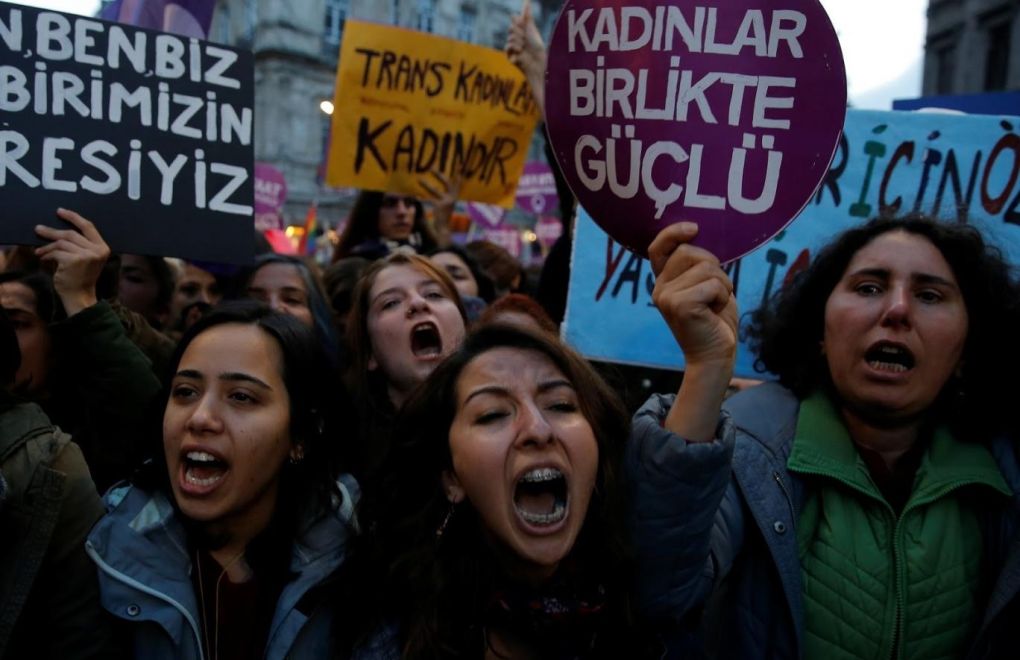

-132.jpg)
